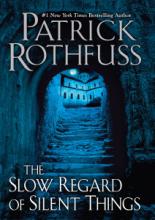The Slow Regard of Silent Things - Patrick Rothfuss

The Slow Regard of Silent Things is a short story featuring Auri, a character from the Kingkiller Chronicle. The book is unique and good.
The story it tells doesn't have a lot of the normal elements of a story. There is only one character, so the only dialogue is with inanimate objects. There isn't a lot of action. There is, however, a strong sense of identity.
Auri believes that all things should be in their proper place, and she works for much of the book putting things in their proper place. This manifests as interior decorating using junk in a place that no one will likely ever see, but it gives her purpose.
Auri believes that people should not impose their will on the world. She spends a lot of time beating herself up over little, insignificant selfishnesses, and it probably isn't healthy, but it's all so that she can be a good person.
Auri also believes that she is not right. She knows that she isn't normal and that she has problems to work through, and much of the book is about just that.
The book isn't all about Auri, though. There is a lot of Kingkiller-related foreshadowing in the book. She comments matter-of-factly that the Selas flower isn't for Kvothe, when Selas is the ongoing symbol of Denna. She makes a place for Kvothe to come when he is broken, and we all know just how broken he is in the present day (though, since Auri wasn't in the first draft of the Kingkiller Chronicle, it makes me suspect that she won't actually save the day for Kvothe in the end). And most of the book in general is about Auri preparing a gift for Kvothe.
I was actually a little frustrated that the book wasn't all about Auri, that the idea of Kvothe kept creeping in. Even though the book goes into Auri, it does so in a way that seems to make her dependent on him rather than a strong, independent character (even though she is strong and independent). I guess I wanted something more like Karrin Murphy in Aftermath (a short story in the Dresden Files universe) -- yes, she's still thinking about Harry Dresden, but she is a solid, fully-actualized character. That said, I can accept that the portrayal of Auri seemed true to character and that she isn't supposed to be solid or fully actualized.
Overall, a good read if you want to learn more about Auri or if you want a diferent kind of book.



